Kevin Clarke
Operetta Research Center
9 June, 2024
It’s the third attempt in Berlin to breathe new life into the forgotten sub-genre “Heiteres Musiktheater der DDR”, i.e. musicals and operettas written in socialist East Germany between 1949 and 1989. One of the most celebrated composers of such works was Gerd Natschinski (1928-2015) who scored his first major success in 1960 with Messeschlager Gisela, a piece set in the fashion industry, showing how the “collective” of workers ultimately triumphs over the egoism of a (white) old man stuck in pre-revolutionary patriarchal structures.
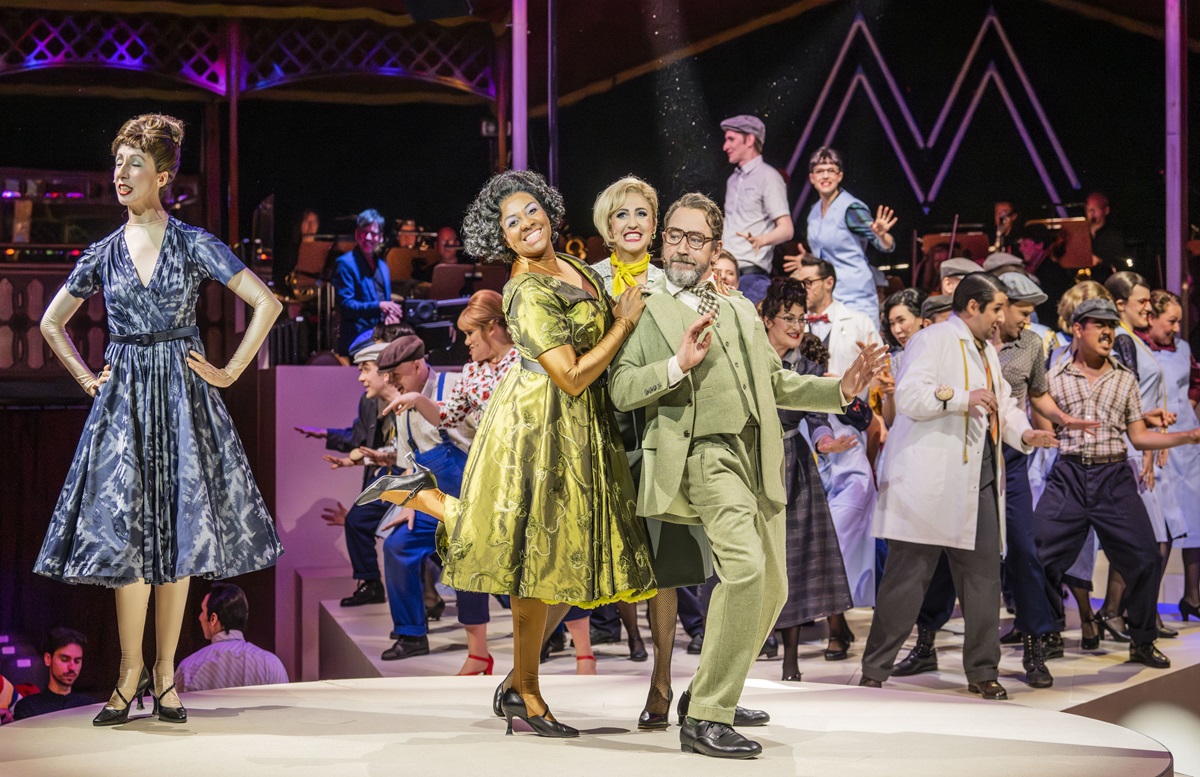
The ensemble with Thorsten Merten and Maria-Danaé Bansen in “Messeschlager Gisela” at Komische Oper Berlin. (Photo: Jan Windszus Photography)
Messeschlager Gisela premiered at the Metropol-Theater in East Berlin, then the “Hauptstadt der DDR”, as the program book for the latest production at Komische Oper states. Because part of the plot describes how characters move back and forth easily between East and West Berlin, and because the “evil” director of the fashion factory in which the story unfolds plans to travel to Paris to get inspiration for his new collection for the big fashion fair in Leipzig, the show had to be re-written once the Wall was built in 1961. Instead of Paris, director Kuckuck travels to Prague in the re-write. And there is no more late-night partying for the “wicked” secretary Marghueritta Kulicke in the capitalist West with men (and alcohol) from the “enemy side” in the later version.
The libretto by Jo Schulz shows, in a hilarious way, how the blessings of socialism can be a burden if individuals (such as Kuckuck and Kulicke) don’t follow the ideological ideals. Of course, the audience was supposed to “learn” that “we” are all far better off in the end if “we” all stick together and do as “we’re told”. So the happy end here is the moment when young and upcoming female fashion worker Gisela Claus triumphs in Leipzig with her very own designs for the modern woman – instead of fancy, but unpractical dresses copied from Paris originals. (Made for women who don’t have to work, but lunch, as Sondheim might have put it.)
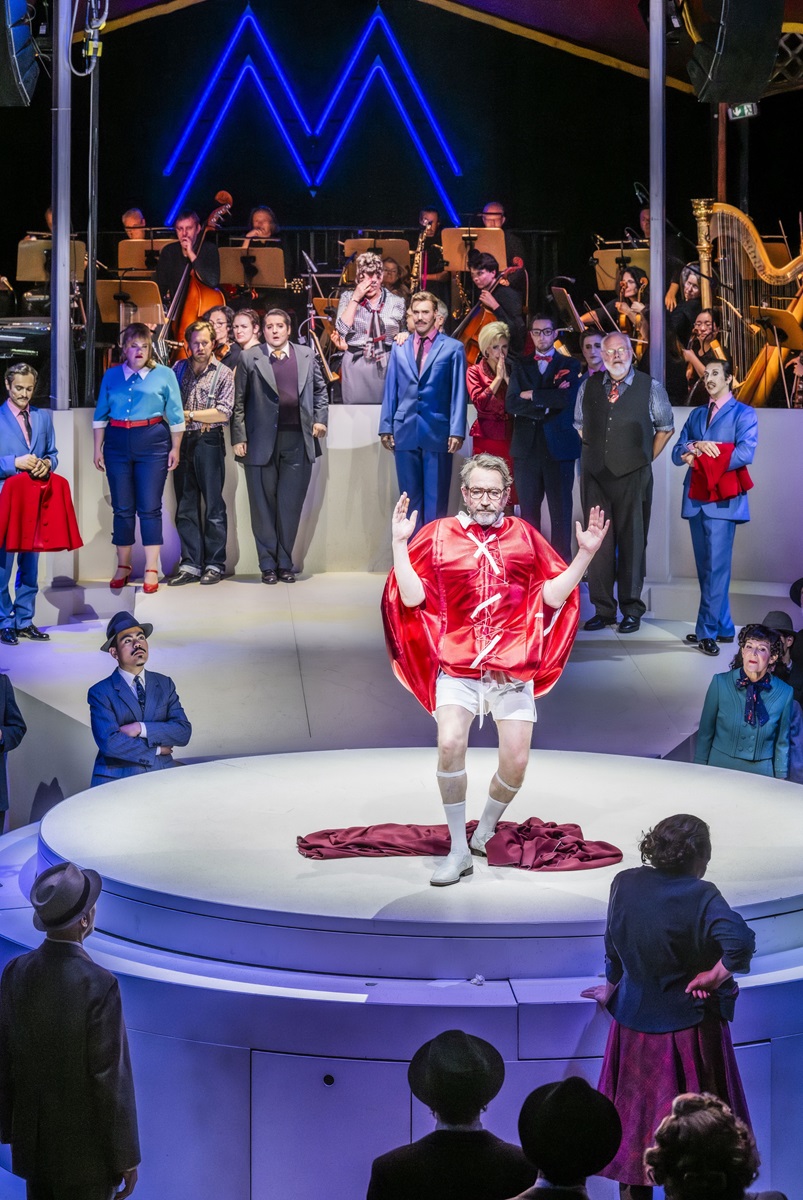
Thorsten Merten as director Kuckuck wearing his Paris inspired “balloon” dress at the fashion fair in Leipzig. (Photo: Jan Windszus Photography)
Back in 1998 the Neuköllner Oper presented a small scale production directed by Peter Lund, that was a blast. I remember seeing it, as my first introduction to “Heiteres Musiktheater”, and loving it. The young cast made the story crystal clear by showing how it’s basically a plot analyzing the power dynamics of the work space, a bit like The Devil Wears Prada years later. Sadly, the CD that was made of that Neuköllner Oper production does not capture the magic at all, and sounds downright awful.
Then, in 2014, the Rüdersdorfer Operettensommer presented Messeschlager Gisela as a simple, yet charming outdoor production, but there was only one (!) performance. No traces left. Sadly.
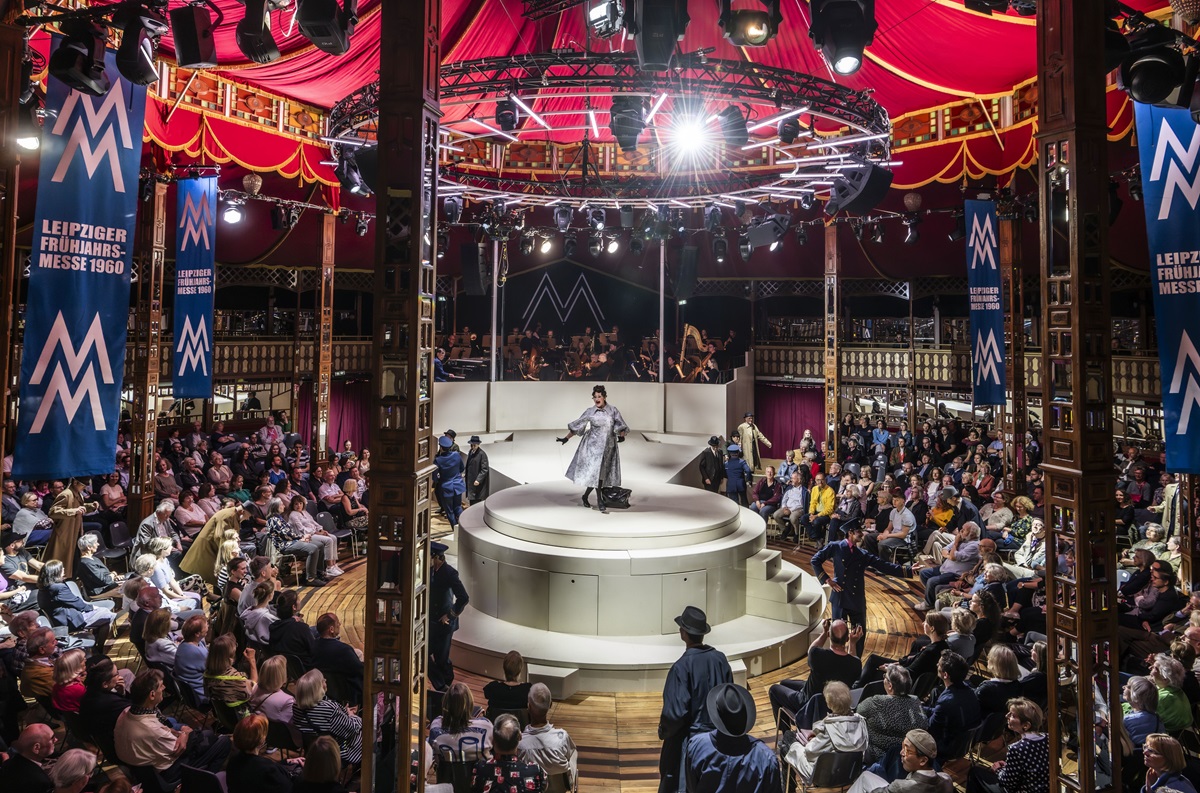
The interior of the tent where “Messeschlager Gisela” is played by Komische Oper Berlin. (Photo: Jan Windszus Photography)
And now, in 2024, the Komische Oper Berlin is offering the piece as a new “focus point” in the operetta repertoire of the new directors Susanne Moser and Philip Bröking.
You’ll recall that Barrie Kosky started his operetta revolution in 2013 with a razzle-dazzle staging of Abraham’s Ball im Savoy. He knew it had the be spectacular to make a splash – and it did. The show almost boiled over with amazing sets, amazing dancing, an amazing cast, and amazingly reconstructed music (conducted by Adam Benzwi). Kosky & Co. singlehandedly put Abraham and Weimar Republic operettas back on the international map.
A little later, the late Stefan Huber started a second operetta series at Komische Oper with Dostal’s Clivia and also understood that it had to be larger than life to be noticed. And it was. The sets took your breath away, Christoph Marti as a cross-dressed Clivia was so wow you couldn’t stop marveling at every move he/she made. A major Clivia revival was kicked off by this, followed later by an equally impressive staging of Roxy und ihr Wunderteam.
Now, in the post-Kosky era of Komische Oper, Moser and Bröking asked Axel Ranisch to stage Messeschlager Gisela as the start of their “DDR Operetta Revival”, to be followed next season by Natschinski’s Mein Freund Bunbury – which is the single most successful show of all “Heiteres Musiktheater” titles. As a venue, Ranisch is given a huge tent newly set up in front of the Rotes Rathaus in the center of Berlin. It’s like a bigger version of the cozy Bar jeder Vernunft where the Geschwister Pfister once staged the legendary Im weißen Rössl (1994).
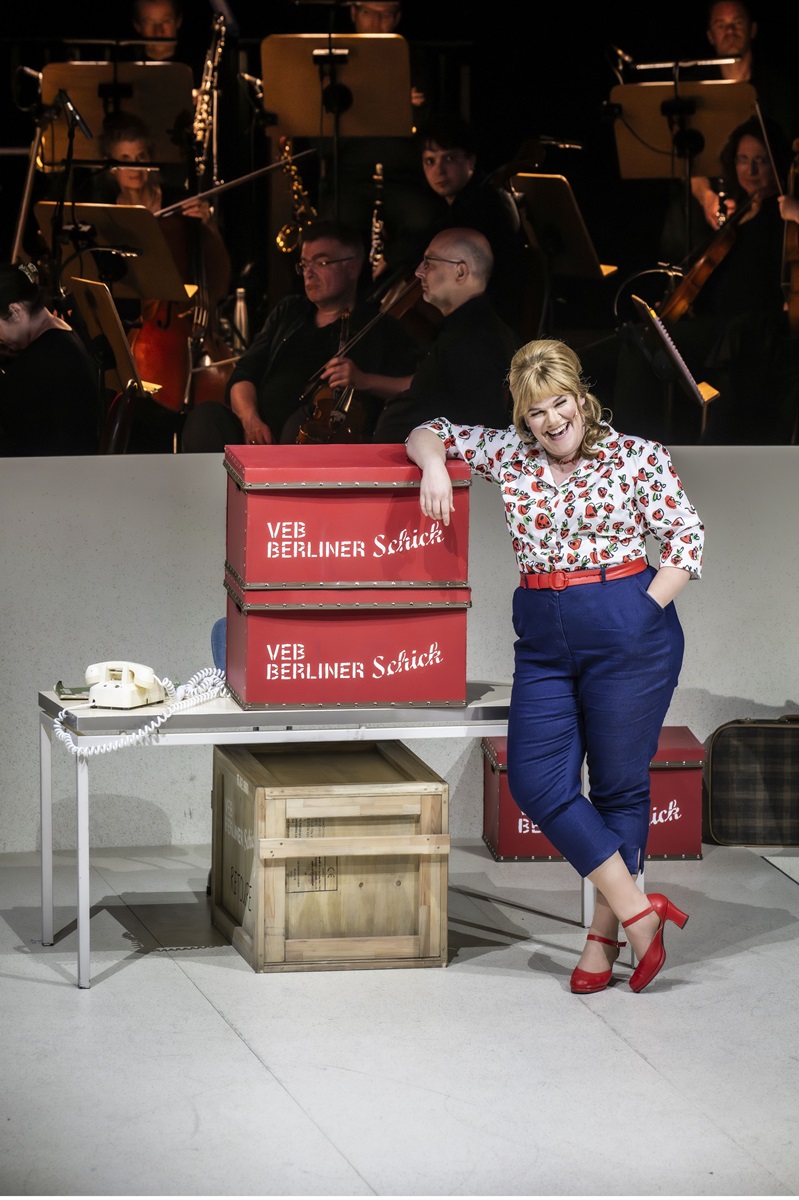
Gisa Flake as Gisela in “Messeschlager Gisela”. (Photo: Jan Windszus Photography)
In this tent, the orchestra under the direction of Adam Benzwi is sat – like a circus band – higher up. And from the band stand a runway extends into the middle of the space. The audience is seated, in a circle, all around.
It’s a minimalist stage, almost Shakespearean, but it offers many possibilities to move around outside the typical operetta box. When the overture starts, we hear newly arranged Natschinski music with a seductive Sixties sound. It’s more Las Vegas than DDR, but it’s marvelous. Absolutely stunning. Especially the famous slow songs “Wie schön, von ganzem Herzen glücklich zu sein“ and „Rote Rosen“. Strangely, the rousing big chorus numbers, like „Die Welt gibt sich ein Rendezvous in Leipzig bei der Messe“, lack the ultimate punch, a power you can hear on the famous recording made by Amiga Records, accessible today via YouTube.
Ranisch and Benzwi have assembled a stellar cast of singing actors who can turn a minimalist stage into a world of its own. Nico Holonics (a guest from Berliner Ensemble, where he’s the celebrated Mack the Knife in Kosky’s Dreigroschenoper) needs to be mentioned first and foremost as a hyper active and impressive Fred Funke, journalist turned undercover activist. Next to him, Thorsten Merten as director Kuckuck gives a master class in stage presence and portraying unsympathetic characters in a way that makes them lovable anyway.
Maria-Danaé Bansen as the lusty secretary Marghueritta Kulicke pulls all the stops out too, and really rocks the boat in her solos. (Of which there are many.)
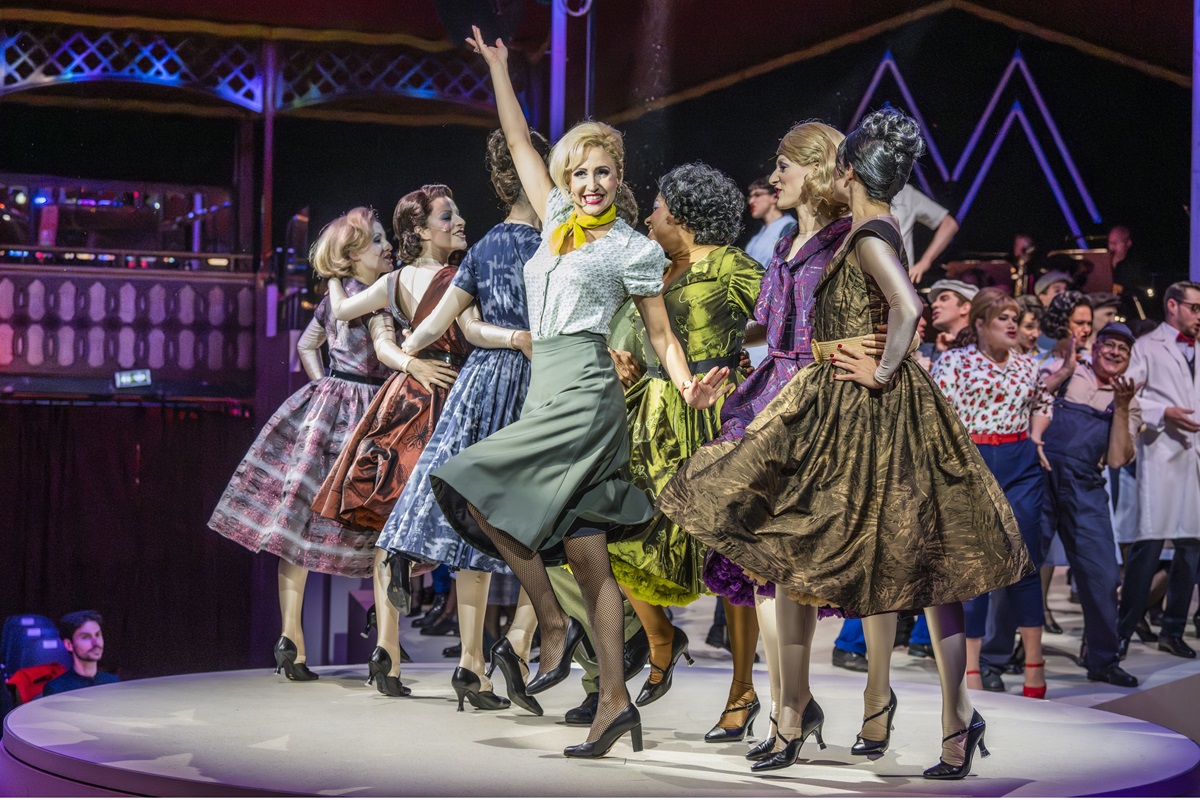
Maria-Danaé Bansen as the secretary Kulicke in “Messeschlager Gisela”. (Photo: Jan Windszus Photography)
But – and yes, there is a but – at no point in this production is there a wow effect. Nothing like a opening sequence Kosky put in at the beginning of Ball im Savoy to knock you sideways, nothing like those giant gold-glittering jungle flowers in Clivia (not to mention the swans). Nothing like the magical elements in Ranisch’s music films, such as the recent Orphea in Love, where music, visuals and story merge into one happy special moment.
It seems that Ranisch didn’t stop to think how he could make this Messeschlager Gisela extra exceptional. The sets by Saskia Wunsch and the costumes by Alfred Mayerhofer are nice to look at, but that’s it. The choreography by Christoph Tölle is fun (as are the dancers). But they are also not going to make headline news in the New York Times.
And, most frustrating of all, the staging never tries to show any emotional interaction between the characters. They remain cardboard figures throughout, arranged on the white runway. But rarely engaging with each other in any significant way. Which is especially true for Gisa Flake as Gisela. She seems almost lost in this production, standing there as if not knowing what to do with her role, her music, this show. No matter how hard Nico Holonics tries to woe her into action.
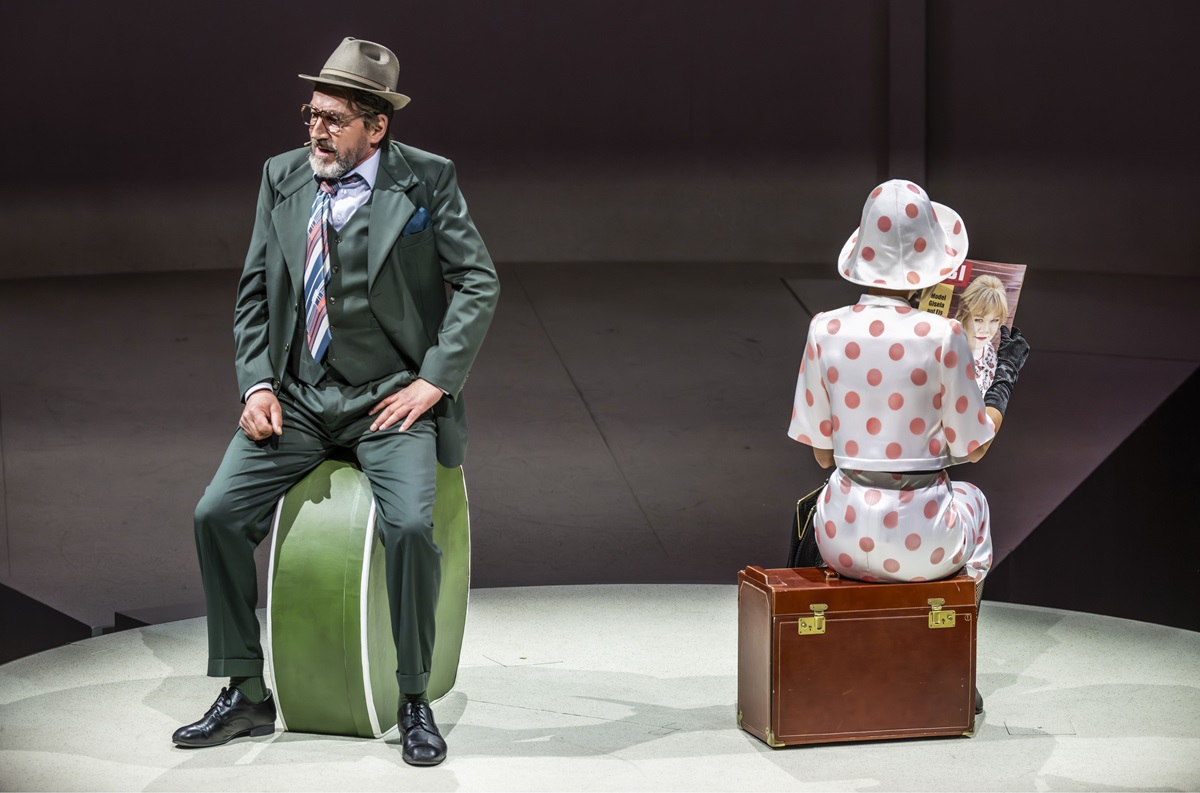
Thorsten Merten and Maria-Danaé Bansen in “Messeschlager Gisela”. (Photo: Jan Windszus Photography)
Maybe it was opening night nerves? Maybe it’ll get better once the show is running? Maybe maybe maybe… I certainly hope it does. Because it’s a lovely piece, shown here in a mash-up of various versions (dramaturgy: Johanna Wall) that sort of take the punch out of the original story. You need to know what life in the DDR in 1960 was like to fully get the jokes. Ranisch doesn’t attempt to capture the Lebensgefühl of back then. As a consequence, he doesn’t take us along, in a time travel kind of way, to a forgotten socialist universe. Not like successful tv series such as Deutschland 89 or movies like Sonnenallee or Good Bye, Lenin!
So can this production of Natschinski start a major revival of “Heiteres Musiktheater der DDR”, on a scale of Kosky’s Weimar Republic pieces and the Stefan Huber/Geschwister Pfister productions? From the reactions I got after opening night from friends I bumped into I’d say: no.
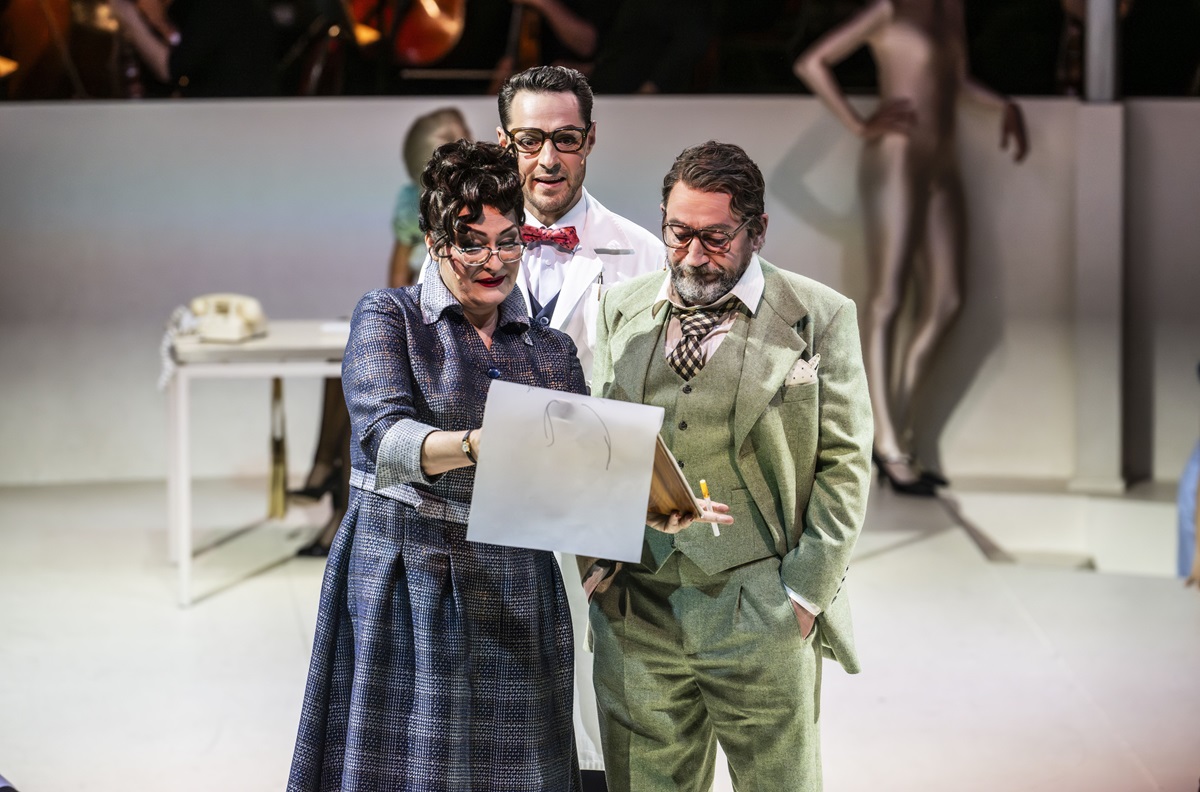
Andreja schneider, Johannes Dunz and Thorsten Merten in “Messeschlager Gisela”. (Photo: Jan Windszus Photography)
It’s still a unique chance to hear and see this piece. And because Axel Ranisch is such a wonderfully communicative person who can talk about music like few others, he has put Messeschlager Gisela on the map with many interviews and tv appearances. And that, in itself, is a great thing which should not to be underestimated.
Why he didn’t try to be more “big bang” with this first DDR operetta on a major stage in Berlin after 1989/90 remains his secret. Adam Benzwi makes the music soar, and I can only hope someone will produce a cast album. The actors – and one must also mention Andreja Schneider as Emma Puhlmann, head of production at the fashion factory VEB Berliner Schick, and Johannes Dunz as Heinz Stubnick among others – are all outstanding, even if on auto pilot. The added queer elements seem somewhat labored, and having me (of all people) complain about this indicates how labored they are. (I liked them anyway.)
Yes, I want to go see this Messeschlager Gisela again and again. There are standing places for only 15 Euros. So it’s not an investment to give the show more than one shot. And who knows, perhaps someone will film it too and preserve it for eternity – or international distribution?

Wolgang Jansen’s “Popular Music Theatre Under Socialism.” (Photo: Waxmann)
At the premiere, Natschinski’s widow and son Lukas were there, beaming and happy. I can only hope that the international press will take interest in this piece and forgotten DDR repertoire, because it’s something worth exploring, as David Savran points out in his recent book Tell It to the World.
And, yes, this new staging is fun, in case you were wondering. So give it a try!
There are performances till 7 July. For more details click here.
